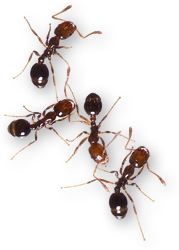This page has been archived and is being provided for reference purposes only. The page is no longer being updated, and therefore, links on the page may be invalid.
|
Partner Sought for Development of New Biological Control for Fire Ants
By Sharon DurhamApril 17, 2007
A virus technology with potential to control red imported fire ants (Solenopsis invicta) is available for licensing from the Agricultural Research Service (ARS). Cooperators are being sought to develop methods for growing and packaging the virus commercially, and for applying it under field conditions.
This pest's massive colonies can cause severe economic problems from crop losses, damage to farm and electrical equipment, and accelerated soil erosion. They also pose a severe threat to humans and livestock vulnerable to the ants' stinging attacks.
Scientists in the Imported Fire Ant and Household Insects Research Unit at the ARS Center for Medical, Agricultural and Veterinary Entomology in Gainesville, Fla., are working with an ant-infecting virus called Solenopsis invicta virus-1, or SINV-1. They have found it to occur in about 20 percent of red imported fire ant fields, where it appears to cause the slow death of infected colonies.
The mission of ARS entomologist Steven Valles and other researchers in the Gainesville unit is to find and exploit disease-causing microbes that could be used to control troublesome insect pests. This SINV-1 technology—still in its early research stage—is the first confirmed virus to be recovered from red imported fire ants.
In the laboratory, SINV-1 has proven to be both self-sustaining and transmissible. Once introduced, it can eliminate a colony within two to three months. That's why the Gainesville researchers think it has potential for cultivation and development in the lab into a viable biopesticide for controlling S. invicta.
Integrating the virus into attractant baits could yield a tool for use by the pest-control industry, agricultural producers and harvesters, consumers and others for whom fire ants are a persistent problem.
ARS is the U.S. Department of Agriculture's chief scientific research agency.

